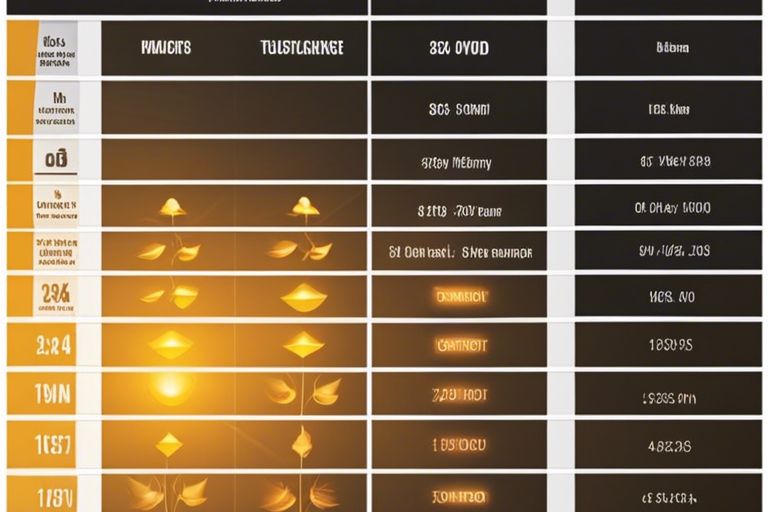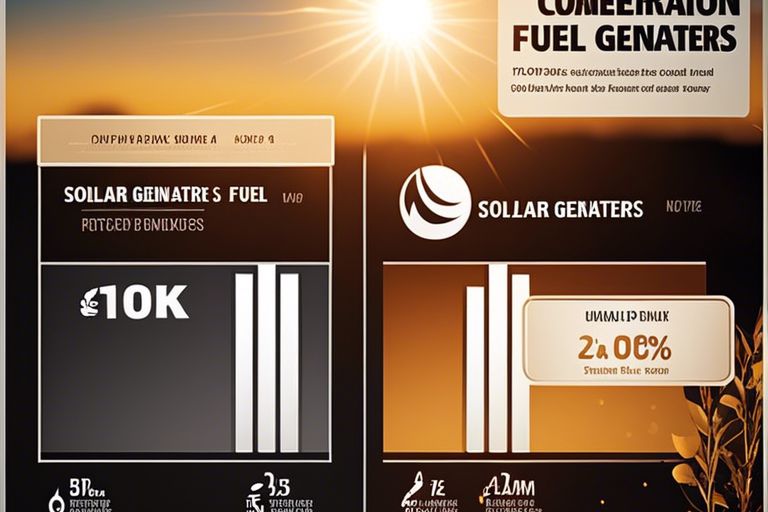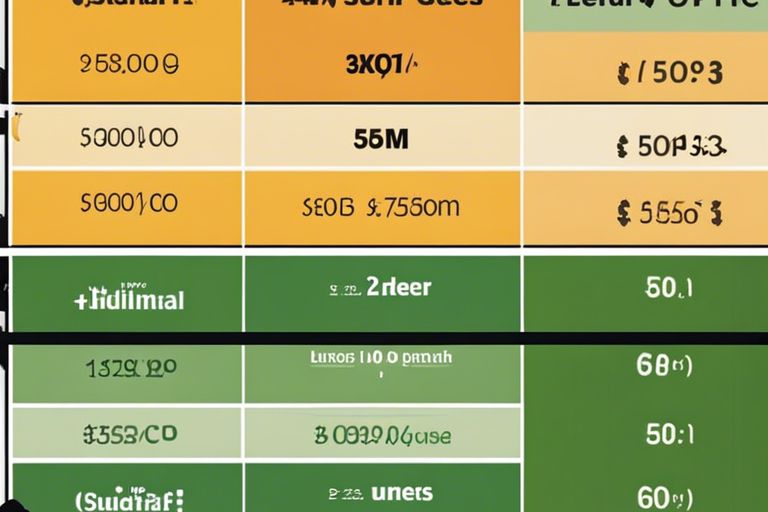Over the years, you may have heard conflicting opinions about the value of solar power generators. In this blog post, we will explore the question, “Are solar power generators worth it?” by delving into the key factors to consider before making this eco-friendly investment. By the end, you will have a clearer understanding of whether a solar power generator is a practical and cost-effective choice for your energy needs.

Key Takeaways:
- Initial Cost: Solar power generators can be costly upfront, but they can provide long-term savings on electricity bills.
- Environmentally Friendly: Solar power is renewable and produces clean energy, reducing the carbon footprint.
- Backup Power: Solar generators can provide a reliable source of backup power during outages or emergencies.
- Portability: Some solar generators are portable, making them convenient for camping, RV trips, or outdoor events.
- Government Incentives: In many locations, there may be tax incentives or rebates available for installing solar power systems, making them more affordable.
Benefits of Solar Power Generators
Environmental Advantages
Generators powered by solar energy have significant environmental advantages. By harnessing the power of the sun, these generators produce clean and renewable energy, reducing your carbon footprint and helping to combat climate change. Unlike traditional fossil fuel generators that emit harmful gases and contribute to air pollution, solar power generators operate silently and produce no harmful emissions.
Energy Independence
On top of their environmental benefits, solar power generators offer you greater energy independence. By producing electricity from sunlight, you can reduce your reliance on the traditional power grid, especially during emergencies or power outages. This independence gives you peace of mind knowing that you have a reliable source of power that is not subject to fluctuations in energy prices or grid failures.
Investing in solar power generators provides you with a backup power solution that is not only reliable but also sustainable. By generating your electricity, you can hedge against rising utility costs and have a backup plan in place in case of emergencies or natural disasters that disrupt the traditional power supply.
Cost-Effective
For many homeowners, solar power generators offer a cost-effective energy solution in the long run. While the initial investment may seem high, the savings generated from reduced electricity bills over time can make it a financially savvy choice. Additionally, there are often tax incentives and rebates available for installing solar power systems, making them even more affordable.
Independence from the grid means that you are less susceptible to fluctuations in energy prices set by utility companies. By generating your electricity, you can control your energy costs and avoid the unpredictability of traditional utility bills, ultimately saving you money in the long term.

Types of Solar Power Generators
Little do you realize the variety of solar power generators available in the market. Understanding the different types can help you make an informed decision when considering investing in one for your energy needs. Here is a breakdown of the types of solar power generators:
| Portable Solar Generators | Standalone Solar Generators |
| Grid-Tie Solar Generators |
Portable Solar Generators
Generators in this category are lightweight, compact, and easy to transport, making them ideal for camping, outdoor events, or as backup power during emergencies. They typically come with solar panels, a battery to store energy, and various outlets to power small devices. Perceiving the versatility and convenience portable solar generators offer, they are a popular choice for those on the move.
Standalone Solar Generators
Types of standalone solar generators include off-grid systems that function independently of the main power grid. These generators are designed to power entire homes or specific appliances and are usually equipped with larger solar panels and battery storage to provide reliable electricity. Powering your home with a standalone solar generator can offer peace of mind during power outages and reduce your dependence on traditional energy sources.
Grid-Tie Solar Generators
Power your home efficiently with grid-tie solar generators that are connected to the utility grid. These systems generate electricity from the sun and feed any excess power back into the grid, offsetting your utility costs through net metering. By integrating renewable energy into your home while staying connected to the grid, you can take advantage of incentives and contribute to a sustainable energy future.
In Standalone Solar Generators, there is a variety of choices available, from smaller setups for powering specific appliances to larger systems capable of powering entire households. The standalone option allows you to tailor the generator’s size and capacity according to your energy needs.
How Solar Power Generators Work
Photovoltaic Cells
Not only do solar power generators offer a sustainable energy solution, but they also operate through fascinating technology.
With photovoltaic cells at the core, solar panels convert sunlight into electricity. When sunlight hits these cells, electrons are set in motion, creating a flow of electricity. This direct current (DC) power generated by the panels serves as the starting point for powering your devices.
Inverters and Charge Controllers
Solar power generators go beyond just harnessing sunlight.
Solar inverters and charge controllers play crucial roles in converting the DC power produced by the panels into alternating current (AC) electricity that can be used in your home. Inverters are responsible for this conversion process, ensuring that the electricity generated is compatible with your household appliances. Charge controllers, on the other hand, regulate the voltage and current coming from the solar panels to prevent overcharging of the batteries.
For instance, inverters help in maximizing the efficiency of your solar power system by converting DC power to AC power smoothly. They also provide real-time data on the energy production of your solar panels, allowing you to monitor and optimize your energy usage.
Battery Storage
One of the key components that make solar power generators versatile is the inclusion of battery storage.
Batteries store the excess electricity generated during sunny days for use during periods of low sunlight or at night. This storage capability allows you to have a consistent power supply even when sunlight is not readily available, offering greater energy independence.
For instance, having a reliable battery storage system ensures that you can power your crucials during unexpected power outages or emergencies. It provides a backup solution that enhances the reliability of your solar power generator.
Advantages of Solar Power Generators
Low Maintenance
Power generators often require regular maintenance to ensure they function properly when you need them most. However, solar power generators have a distinct advantage in this regard. Keep in mind that solar panels have no moving parts, which significantly reduces the risk of malfunctions or breakdowns. This means that once you have your solar power generator installed, you can enjoy reliable power without the need for frequent maintenance.
Quiet Operation
For a peaceful power generation experience, solar power generators offer quiet operation compared to traditional fuel-powered generators. You won’t have to deal with the loud noise typically associated with generators running on gasoline or diesel. This makes solar power generators a great choice for maintaining a peaceful environment during power outages or outdoor activities.
Additionally, the quiet operation of solar power generators can be beneficial in various settings. Whether you’re using them for camping, outdoor events, or as a backup power source at home, you can enjoy a quieter and more pleasant power generation experience.
Scalability
To meet your power needs effectively, scalability is key, and solar power generators excel in this area. You can start with a basic setup and easily expand your solar power system by adding more panels or batteries as needed. This flexibility allows you to customize your solar power generator to suit your specific energy requirements, whether you’re looking to power a small cabin off the grid or supplement your home’s electricity supply.
Understanding the scalability of solar power generators gives you the freedom to adapt your system over time, accommodating changes in energy usage or expanding your power capabilities without needing to invest in an entirely new setup. This scalability factor can make solar power generators a smart and cost-effective long-term energy solution for your needs.
Disadvantages of Solar Power Generators
High Upfront Costs
To dive deeper into the drawbacks of solar power generators, you must consider the high upfront costs associated with them. As Best Solar Generators of 2024 suggest, the initial investment for a solar power generator can be significant. While solar energy is free once the system is in place, the upfront expenses for purchasing and installing the solar panels, batteries, and other components can be a barrier for many individuals.
Intermittent Energy Source
With solar power generators, one of the key disadvantages is the intermittent nature of solar energy. Solar panels generate electricity only when exposed to sunlight, which means at night or during cloudy days, your energy production may be limited. This variability in energy generation can pose challenges, especially if you rely solely on solar power for your energy needs.
However, innovative technologies like battery storage systems are emerging to address the issue of intermittent solar energy. These systems can store excess energy generated during peak sunlight hours for use during periods of low sunlight, providing a more consistent energy supply.
Space Requirements
Space requirements are another factor to consider when evaluating the drawbacks of solar power generators. Solar panels require a significant amount of space to be installed effectively. Depending on the size of the system you need and the amount of sunlight your location receives, you may need a substantial area for mounting the panels. This can be a limiting factor for those with limited outdoor space or living in densely populated urban areas.
Nevertheless, advancements in solar technology, such as the development of more efficient solar panels and designs, are helping to reduce the space requirements of solar power systems. These innovations aim to make solar energy more accessible and practical for a broader range of individuals and locations.
Real-World Applications
Camping and Outdoor Activities
The idea of harnessing solar power for your camping trips and outdoor activities is exciting. With a portable solar power generator, you can enjoy off-the-grid adventures without worrying about running out of power for your devices. These compact units are easy to transport and set up, providing you with a reliable source of electricity wherever your adventures take you.
Remote Homes and Cabins
Activities such as living in a remote home or cabin can greatly benefit from solar power generators. In these environments, where traditional power sources may be limited or expensive to install, solar power offers a sustainable and cost-effective alternative. By harnessing the sun’s energy, you can power your imperative appliances and devices, ensuring a comfortable and enjoyable living experience.
Another advantage of using solar power generators in remote homes and cabins is the independence they provide. You are no longer reliant on the grid for your power needs, giving you peace of mind in case of power outages or disruptions.
Emergency Backup Power
Emergency situations can arise unexpectedly, leaving you without power when you need it most. Having a solar power generator as a backup power source can be a game-changer in such circumstances. These generators can keep your lights on, charge your devices, and power imperative medical equipment, ensuring that you and your loved ones stay safe and connected during emergencies.
For instance, during natural disasters or extended power outages, a solar power generator can be a reliable lifeline, providing you with the electricity you need until the situation is resolved.
To wrap up
From above, you now have a better understanding of solar power generators and their benefits and drawbacks. While they can be a great investment for some, it’s vital to consider factors such as upfront costs, location, and energy needs before making a decision. Keep in mind, solar power generators may not be worth it for everyone, but with the right research and planning, they could be a sustainable and cost-effective option for you.
FAQ
Q: Are solar power generators worth the investment?
A: Yes, solar power generators can be worth the investment for many reasons. They provide a renewable and clean source of energy, saving money on electricity bills in the long run. Additionally, they are environmentally friendly and can provide backup power during outages.
Q: How do solar power generators work?
A: Solar power generators work by capturing sunlight with photovoltaic cells, which convert the sunlight into electricity. This electricity can then be stored in batteries for later use or fed directly into the electrical grid.
Q: What are the benefits of using a solar power generator?
A: Some benefits of using a solar power generator include lower electricity bills, reduced carbon footprint, energy independence, and the ability to power crucial appliances during power outages. Additionally, solar power generators require minimal maintenance once installed.
Can you sell power back to the grid in Oregon
